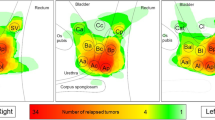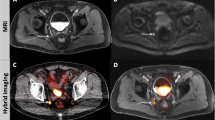Abstract
Purpose
In this study, we evaluated the impact of 18F-PSMA-11 PET/CT on the patient management plan in patients with primary or recurrent disease. Furthermore, a correlation between PET findings and other modalities was performed.
Procedures
In this prospective observational study, 60 prostate cancer patients (9 primary staging, 51 biochemical recurrence) were imaged with 18F-PSMA-11 PET/CT. Pre- and post-scan questionnaires were completed by the treating physician to observe changes in therapy intent. Follow-up data (histological confirmation, MRI imaging, and PSA values after radiotherapy without implementation of systemic therapy) was correlated with the 18F-PSMA-11 findings.
Results
The patient-based detection rate was 82% and a management change was seen in 52% of the cases. The heterogeneous characteristics of the included patients resulted in a widely varying treatment change, mostly originating from an increase of disease extent on 18F-PSMA-11 PET/CT.
Conclusion
18F-PSMA-11 PET/CT showed to be a highly promising method for the detection of prostate cancer lesions.




Similar content being viewed by others
References
N. Mottet, P. Cornford, R.C.N. van den Bergh, E. Briers, M. De Santis, S. Fanti, S.Gilessen, J. Grummet, A. M. Henry, T. B. Lam, M.D. Mason, T.H. van der Kwast, H.G. van der Poel, O. Rouvière, I.G. Schoots, D. Tilki, T. W. EAU-EANM-ESTRO-ESUR-SIOG Guidelines on prostate cancer.
Corfield J, Perera M, Bolton D, Lawrentschuk N (2018) 68Ga-prostate specific membrane antigen (PSMA) positron emission tomography (PET) for primary staging of high-risk prostate cancer: a systematic review. World J Urol 36:519–527
Hofman MS et al (2020) Prostate-specific membrane antigen PET-CT in patients with high-risk prostate cancer before curative-intent surgery or radiotherapy (proPSMA): a prospective, randomised, multicentre study. Lancet 395:1208–1216
Murthy, V. et al. Prostate-only versus whole-pelvic radiation therapy in high-risk and very high-risk prostate cancer (POP-RT): outcomes from phase III randomized controlled trial. J. Clin. Oncol. JCO.20.03282 (2021) https://doi.org/10.1200/jco.20.03282.
Luiting HB et al (2020) Use of gallium-68 prostate-specific membrane antigen positron-emission tomography for detecting lymph node metastases in primary and recurrent prostate cancer and location of recurrence after radical prostatectomy: an overview of the current literature. BJU Int 125:206–214
Perera M et al (2020) Gallium-68 prostate-specific membrane antigen positron emission tomography in advanced prostate cancer—updated diagnostic utility, sensitivity, specificity, and distribution of prostate-specific membrane antigen-avid lesions: a systematic review and meta-. Eur Urol 77:403–417
Kersemans K et al (2018) Automated radiosynthesis of Al[18F]PSMA-11 for large scale routine use. Appl Radiat Isot 135:19–27
Piron S et al (2019) Radiation dosimetry and biodistribution of 18F-PSMA-11 for PET imaging of prostate cancer. J Nucl Med 60:1736–1742
Piron, S. et al. Optimization of PET protocol and interrater reliability of 18F-PSMA-11 imaging of prostate cancer. EJNMMI Res. 10, (2020).
Maurer T et al (2016) Diagnostic efficacy of 68Gallium-PSMA positron emission tomography compared to conventional imaging for lymph node staging of 130 consecutive patients with intermediate to high risk prostate cancer. J Urol 195:1436–1443
Morigi JJ et al (2015) Prospective comparison of 18F-fluoromethylcholine versus 68Ga-PSMA PET/CT in prostate cancer patients who have rising PSA after curative treatment and are being considered for targeted therapy. J Nucl Med 56:1185–1190
Van Leeuwen PJ et al (2016) 68Ga-PSMA has a high detection rate of prostate cancer recurrence outside the prostatic fossa in patients being considered for salvage radiation treatment. BJU Int 117:732–739
Bluemel, C. et al. Impact of 68Ga-PSMA PET/CT on salvage radiotherapy planning in patients with prostate cancer and persisting PSA values or biochemical relapse after prostatectomy. EJNMMI Res. 6, (2016).
Albisinni S et al (2017) Clinical impact of 68Ga-prostate-specific membrane antigen (PSMA) positron emission tomography/computed tomography (PET/CT) in patients with prostate cancer with rising prostate-specific antigen after treatment with curative intent: preliminary analysis o. BJU Int 120:197–203
Hope TA et al (2017) Impact of 68Ga-PSMA-11 PET on management in patients with biochemically recurrent prostate cancer. J Nucl Med 58:1956–1961
Afaq A et al (2018) Impact of 68 Ga-prostate-specific membrane antigen PET/CT on prostate cancer management. J Nucl Med 59:89–92
Roach PJ et al (2018) The impact of 68 Ga-PSMA PET/CT on management intent in prostate cancer: results of an Australian prospective multicenter study. J Nucl Med 59:82–88
Calais J et al (2018) Impact of 68 Ga-PSMA-11 PET/CT on the management of prostate cancer patients with biochemical recurrence. J Nucl Med 59:434–441
Bashir U et al (2019) Impact of Ga-68-PSMA PET/CT on management in prostate cancer patients with very early biochemical recurrence after radical prostatectomy. Eur J Nucl Med Mol Imaging 46:901–907
Hofman, M. S. et al. Articles Prostate-specific membrane antigen PET-CT in patients with high-risk prostate cancer before curative-intent surgery or radiotherapy (proPSMA): a prospective, randomised, multicentre study. www.thelancet.com395, (2020).
Fendler, W. P. et al. Impact of 68 Ga-PSMA-11 PET on the management of recurrent prostate cancer in a prospective single-arm clinical trial. J. Nucl. Med. jnumed.120.242180 (2020) https://doi.org/10.2967/jnumed.120.242180.
Sweeney CJ et al (2015) Chemohormonal therapy in metastatic hormone-sensitive prostate cancer. N Engl J Med 373:737–746
Somanathan H et al (2004) R: a language and environment for statistical computing. R Foundation for Statistical Computing Oecologia 15:413–448
Revelle, W. Package ‘psych’ - procedures for psychological, psychometric and personality research. R Packag. 1–358 (2015).
Mangiafico, S. An R companion for the handbook of biological statistics. Rutgers Coop. Ext. 41–58 (2015).
D’Amico AV et al (1998) Biochemical outcome after radical prostatectomy, external beam radiation therapy, or interstitial radiation therapy for clinically localized prostate cancer. J Am Med Assoc 280:969–974
Van den Broeck T et al (2020) Biochemical recurrence in prostate cancer: the European Association of Urology Prostate Cancer Guidelines Panel Recommendations. Eur Urol Focus 6:231–234
Boschi S et al (2016) Synthesis and preclinical evaluation of an Al18F radiofluorinated GLU-UREA-LYS(AHX)-HBED-CC PSMA ligand. Eur J Nucl Med Mol Imaging 43:2122–2130
Han S, Woo S, Kim YJ, Suh CH (2018) Impact of 68Ga-PSMA PET on the management of patients with prostate cancer: a systematic review and meta-analysis. Eur Urol 74:179–190
Morris MJ et al (2020) Impact of PSMA-targeted imaging with 18F-DCFPyL-PET/CT on clinical management of patients (pts) with biochemically recurrent (BCR) prostate cancer (PCa): results from a phase III, prospective, multicenter study (CONDOR). J Clin Oncol 38:5501–5501
Afshar-Oromieh, A. et al. Performance of [68Ga]Ga-PSMA-11 PET/CT in patients with recurrent prostate cancer after prostatectomy—a multi-centre evaluation of 2533 patients. Eur. J. Nucl. Med. Mol. Imaging 1–10 (2021) https://doi.org/10.1007/s00259-021-05189-3.
Acknowledgements
The authors would like to thank all the participating staff members and physicians of the Department of Radiotherapy and Urology of Ghent University Hospital for the well-appreciated efforts to recruit patients for the study and for filling out an endless stream of paperwork. Also, a special word of thanks is given to the cyclotron team and nursing staff of the Department of Nuclear Medicine for the production of the radiotracer and the outstanding cooperation.
Funding
The study was supported by the Flemish foundation FWO TBM (T001517).
Author information
Authors and Affiliations
Contributions
Guarantor of integrity of the entire study: KDM.
Study concepts and design: PO, KDM, NVL.
Literature research: KDM.
Clinical studies: KDM, VS, BVDB, NVL, NL, VF, PO.
Experimental studies/data analysis: KDM, VS.
Statistical analysis: SP.
Manuscript preparation: KDM, SP.
Manuscript editing: all authors.
Corresponding author
Ethics declarations
Conflict of Interest
Prof. Dr. P. Ost has received research grants from Bayer and Varian and has consulted for Janssen, Bayer, Curium, Novartis, and Ferring. Prof. Dr. N. Lumen has consulted for Bayer, Astra Zeneca, Ipsen, Janssen, and Astellas. The other authors declare that they have no conflict of interests.
Additional information
Publisher’s Note
Springer Nature remains neutral with regard to jurisdictional claims in published maps and institutional affiliations.
Supplementary Information
Below is the link to the electronic supplementary material.
Rights and permissions
About this article
Cite this article
De Man, K., Piron, S., Van Laeken, N. et al. Impact of 18F-PSMA-11 PET/CT on Management of Biochemical Recurrence and High-Risk Prostate Cancer Staging. Mol Imaging Biol 24, 750–758 (2022). https://doi.org/10.1007/s11307-022-01724-2
Received:
Revised:
Accepted:
Published:
Issue Date:
DOI: https://doi.org/10.1007/s11307-022-01724-2




